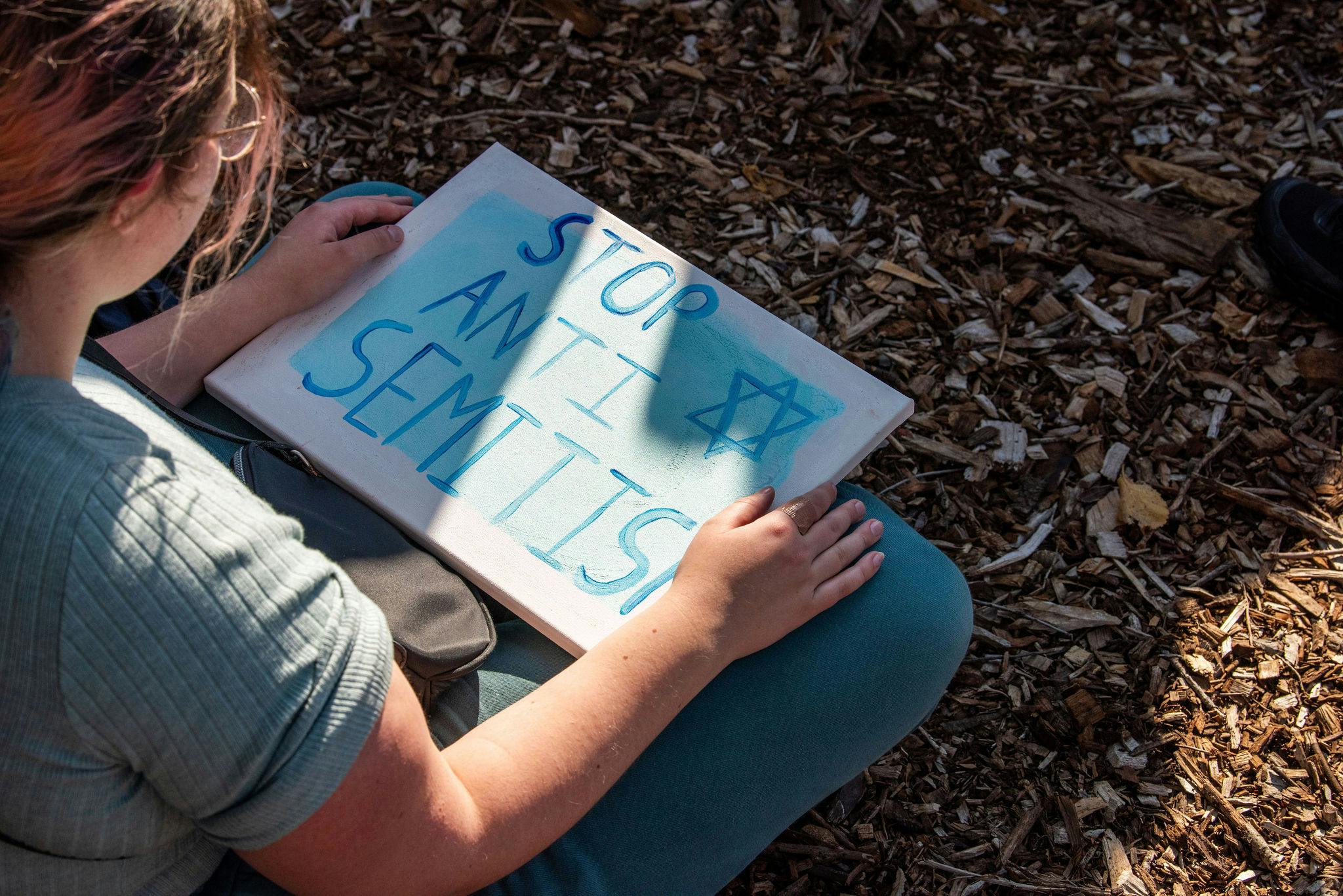Published: 8 May 2024
Last updated: 9 May 2024
Online antisemitism increases five-fold
The most recent Australian research released in March 2024 shows that antisemitism on social media increased five-fold following the October 7 Hamas terror attack, compared to the 11 months before, according to a study conducted by the Online Hate Prevention Institute and Online Hate Taskforce and released exclusively by The Jewish Independent.
Antisemitism increased on all 10 platforms examined but was significantly more visible on some social media sites compared with others. Professional platform LinkedIn, where many users typically avoid politics and controversy, experienced the most dramatic increase in antisemitism, most of it Israel-related.
Traditional antisemitism was the most dominant form, including tropes familiar since the Middle Ages: conspiracy theories alleging that Jews control governments, banks, media, and other institutions; blood libels; holding Jews responsible for killing Jesus; depicting Jews as devils; and claiming Jews are “not human”.
The researchers observed that general hostility towards Israel and Jews arising from the Israel-Hamas war has made antisemitism more acceptable and that social media influencers have jumped on the bandwagon of popular perception.
Racist Anti-Zionism: the newest antisemitism
Researchers Andre Oboler and Jasmine Beinart identified a new form of antisemitism which they call ‘Racist Anti-Zionism’. It is a line of thought that defines Zionism as evil and justifies harming anyone identified with Israel on the grounds that they are supporting oppression.
“Racist Anti-Zionism moves beyond opposition to Zionism as an ideology, and into expressions of hostility and incitement to hate and violence against people who identify as Zionists or have expressed positivity towards Israel,” the researchers wrote.
Racist Anti-Zionists don’t believe they are antisemitic, arguing that Zionism is not Judaism. “The vast majority of Jews are Zionists, so using “Zionists” becomes another way of targeting Jews."
Another significant stream in antisemitism related to Israel is comparing Israeli policies to Nazism, including images which conflated Netanyahu and Hitler or compared Israel’s treatment of Palestinians to the Nazi treatment of Jews.

Antisemitism in Australian schools
Another study found widespread antisemitism in Australian schools. Of 510 teachers and teacher managers in Australian public schools, the report found nearly a quarter have either experienced, witnessed or been informed of an antisemitic incident.
Extrapolating from the national representative sample suggests an average of 75,000 antisemitic incidents per year in government schools across the country.
Of those surveyed, 20% said they had been informed of an incident, 12% said they had witnessed one, and 1% said they had been a victim of antisemitism. Answers to the three questions were not mutually exclusive and 24% answered yes to at least one question.
The Antisemitism in Australian schools study was conducted in November 2023, although it was designed prior to the Hamas attack. It was commissioned by the Blueprint Institute, a Liberal Party-aligned think tank.
The researchers say extrapolating from the national representative sample suggests an average of 75,000 antisemitic incidents per year in government schools across the country. Incidents were more common in secondary schools than primary schools, and boys were the most common offenders. They focused on government schools for pragmatic reasons but noted there was evidence of similar cases in independent schools.
“A rise in antisemitism — or indeed the vilification or dehumanisation of any minority group — have been shown to be leading indicators of democratic backsliding, and deteriorating levels of social cohesion. These are issues of critical importance to all Australians, regardless of race, background, or religion,” read the report.
The report blamed the school environment for some aspects of antisemitism, observing apathy towards antisemitism amongst some members of the teaching workforce and poor pedagogical approaches to teaching the Holocaust.
It also blamed the influence of social media in spreading and normalising antisemitic content and, in some cases, cultural influences from home.

Early reports by the Jewish community
Preliminary research from the Executive Council of Australian Jewry (ECAJ) recorded 662 antisemitic incidents in October and November 2023, compared with just 79 incidents in the same period last year.
Four physical assaults and at least 10 cases of verbal abuse were described in what amounts to a 738% increase, making it clear that October 7 and the subsequent war in Gaza has had a measurable effect on the Australian Jewish community. The provisional figures involve incidents reported to the ECAJ directly as well as through its affiliate organisations and the Community Security Group.
The statistics include verbal abuse and racial slurs, bomb threats, physical assault, calls to boycott Jewish businesses, and graffiti, such as that reading “Jew free zone” and “Jews not welcome”.
President of the Australian Association of Jewish Holocaust Survivors & Descendants George Foster said the impact of this symbolism on Holocaust survivors, and their children and grandchildren who carry the intergenerational trauma of their ancestors, is especially distressing.
“The overwhelming feeling of survivors who have shouted “Never Again” for many years is that “Never Again” is upon us today,” Foster wrote in a statement.


Australia reflects global Jewish experiences
Western countries experienced a massive increase in the number of antisemitic incidents in 2023, according to a report published by the University of Tel Aviv and the Anti-Defamation League (ADL), with the majority of incidents occurring post October 7.
If current trends continue, the curtain may come down on the possibility of maintaining Jewish life in the public sphere in the West – wearing a Star of David, going to a synagogue or community center, sending children to a Jewish school, setting up a student cell on campus or speaking Hebrew.
"The world has seen the worst wave of antisemitic incidents since the end of the Second World War… The data collected from law enforcement authorities, governmental agencies, Jewish organizations, and media platforms tell a story of Jewish existence under growing threat," the report stated.
However, it noted that even in the first nine months of 2023, before the outbreak of the war in Gaza, there was an increase in incidents in most countries with large concentrations of Jews, including the United States, France, Britain, Australia, Italy, Brazil and Mexico. "This means that the war in Gaza helped spread a fire that was already out of control."
The report itself also emphasised that most Jews around the world have not been victims of antisemitic assault or harassment.
"The distress and danger Jews currently experience should not be overstated. This is not 1939, let alone 1942, not anywhere," the report stated. However, "if current trends continue, the curtain may come down on the possibility of maintaining Jewish life in the public sphere in the West – wearing a Star of David, going to a synagogue or community center, sending children to a Jewish school, setting up a student cell on campus or speaking Hebrew".
What can be done?
The Online Hate Prevention Institute report shows policies enforcing community standards works – platforms with strong moderation had less antisemitism and less virulent examples.
Researchers argue there should be a greater expectation on social media platforms to identify and counter antisemitism, including reporting mechanisms that allow users to identify specific antisemitic content, not just generic hate speech; specialist teams capable of identifying antisemitism and dealing with complaints; proactive automated removal of antisemitic content; and Holocaust denial being banned by all platforms.
They also argue governments need to get more involved in countering online antisemitism, a position reflected in the Blueprint Institute’s recommendations.
To counter antisemitism in schools, they support the use of student surveys to identify hotspots; industrial policies which place the onus on teachers; education programs for teachers focused on understanding antisemitism and Jewish history; improving Holocaust education; and including contemporary forms of antisemitism in the Personal Development, Health and Physical Education curriculum.
READ MORE
Antisemitic incidents in the West saw massive spike in 2023, report finds (Haaretz)
Antisemitism surging, report finds, prompting fear for future of ‘Jewish life’ in West (Times of Israel)
RELATED STORIES
‘I want to do jihad’: what a Sydney teen accused of terror offences allegedly messaged (Guardian)
Boys allegedly used messaging apps to discuss plans for an attack, but one of their lawyers says the texts were just ‘bravado’.
Most French Jews experience antisemitism, many remove mezuzah from their homes (YNet)
Disturbing survey conducted in France shows French Jews are subjected to antisemitism due to lack of public knowledge about the Holocaust or because of Israel; Results show that majority of French Muslims hold antisemitic opinions about Jews and 14% of all those polled under age 35 identify with Hamas.
Booking.com removes properties from website after the owner refuses to accept Jewish customers (Jerusalem Post)
Booking.com deleted all properties owned by the Serbian host after he refused to rent to Jews.





Comments2
Dr Michael Liffman, AM9 May at 07:08 am
I welcome this discussion, and would like to add a slightly different perspective:
Anti-semitism: should I be alarmed – or just alert?
I have been re-reading the unbearably heart-rending letters sent from my parents in Germany and Austria to their more fortunate family members in Australia in the years leading to the implementation of the Nazi’s Final Solution. The events they describe should be well-known to anyone with even a modicum of knowledge of recent history (and I fervently hope this is true of the current generation of young people). Indeed the Holocaust is so often recounted in novels and film that I worry that, paradoxically, many are numbed to its horrors.
Yet reading the letters brings to life events that I cannot imagine ordinary people, like my parents or indeed myself, living through: educated and sheltered middle class families on a catastrophic journey from a comfortable respectable life, to being expelled from universities, losing their rights, their livelihoods, their accommodation and finally being transported to concentration camps and mass extermination.
This Holocaust inheritance therefore cannot but make me, and most Jews, alarmed and dismayed at what we see occurring around us in community responses to the dreadful events in the Middle East.
But in another way I am actually heartened. Disturbing as the tensions we see are, I take some comfort in what I believe is a vital, and often overlooked, difference between the anti-semitism of the 1930s and other comparable times and places, and the passions given expression in the present, and I do not see Australia at risk of that horror.
It seems clear that comparisons with Germany in the ’30s, and other times when anti-semitism has been made a key platform of political parties – and indeed governments – or promoted, encouraged, sanctioned or ignored at almost every level of society are misleading, unhistoric, and unhelpful.
That deranged and poisonous era is, thankfully, quite different from the present, where, almost without exception, our political and civic leaders, churches, the media, and our cultural institutions, expressly repudiate anti-semitism (even if some do so less forcefully than they might). Their calls are for the cooling of the temperature and the preservation of cohesion. Extremists are seen for what they are, violence is very rare, and anti-semitic policies or programs are on no agendas.
Arguably, too, the anti-semitism which concerns us is less clear cut and sinister than in the past, conflated as it frequently now is with legitimate (if often unbalanced and ill-informed) debate about the rights and wrongs of the Gaza conflagration.
This is not to deny that there is an enduring historic bedrock of conscious and sub-conscious hostility to Jews, often expressed as a low-grade social prejudice, and not infrequently, in other times, as a fierce and truly frightening full-blown anti-semitism. Gaza, and the sewer that is social media, have now ignited this in some quarters in its most excitable manifestation since the Holocaust.
But while those who forget the past are condemned to relive it, those who remember it may be misled by it.
The current outburst of emotion about the horror of October 7 and beyond, while it has troubling aspects, in the way all such moments of mass excitement usually do, should not blind us to the difference between the past and now, nor inflame an already volatile environment. Anti-semitism is, at the moment, a discredited idea; therein lies some comfort to be found in the difficult moment we are going through.
Dr Michael Liffman, AM
Larry Stillman9 May at 04:01 am
I have a lot of respect for Andre Oberler’s work about online extremism.
However, there is a consistent problem of collapsing social media concerned with Palestine/Israel into the antisemitic category.
Likewise, the surveys conducted by Jewish communal bodies all have serious methodological problems. Only much more rigorous and nuanced research, not conducted by community bodies can provide a more accurate sense of what is actually happening out off-line, so to speak.
I was in fact unaware that the Blueprint survey was affiliated with the Liberal party which explains its extraordinarily exaggerated claims about Australian schools – 75,000 antisemitic events, extrapolated from a relatively small sample and a collapsing of categories used. This is scare tactics. Why TJI has even used it in reporting has to be questioned. I also question any Holocaust education in schools that is separated from learning about genocides that have affected other communities — this is a country that has people coming from many violent situations, some ongoing.
As for campus issues, not so discussed in this article –we must distinguish between what is going on in the US, which is of a vastly different quality and quantity, for a variety of historical reasons that can’t be outline here.
The protests here appear to be largely confined to traditional campus left groups and academics appropriating the cause for broader anti-colonial imperialist and whatever agendas, aligned with some antizionist Jews, but there will be natural empathy from many Muslim students or people from the global south. Some of the language / signage used in anger at Israel’s actions is clearly stupid and offensive, and is best dealt with by universities under their campus behaviour regulations.
It also should be remembered that the vast majority of students have nothing to do with what is going on. Of course, physical harassment and so on is totally unacceptable. But in the same way that a Jewish student might be disturbed or distressed by a Palestinian flag, a Palestinian Australian can be disturbed by an Israeli flag. This sense of offence and challenge goes both ways. This is the price of living in a free society and campuses historically, have been a privileged space for challenging ideas through an open civic space. Unfortunately this idea has come under challenge with attempts to close down discussion and claim absolute truths about controversial issues. I actually ask, where are the grand teach-ins as were in the past where both cases were put? (others have been asking this abroad).
But as well, there has been provocative behaviour by pro-Israel zealots coming onto campus – there is film of this — only making the situation worse. This should be denounced. However, there are also a small number of extremist pro-Palestine individuals such as a woman in Adelaide who has already had a brush with the law and I am sure she is on the radar with authorities. In the long run, strategies to politically isolated such people might be more useful.
And of course, there is continuing neo-Nazi activity that should be countered.